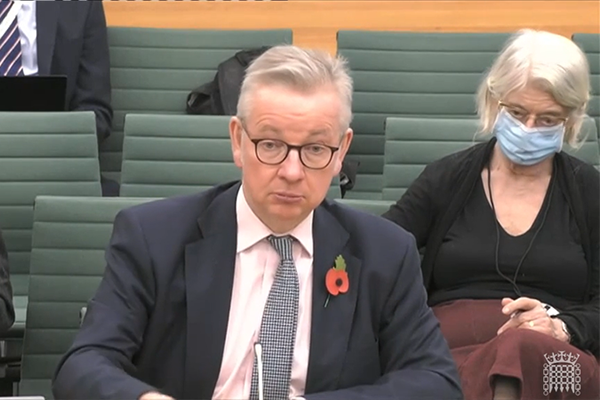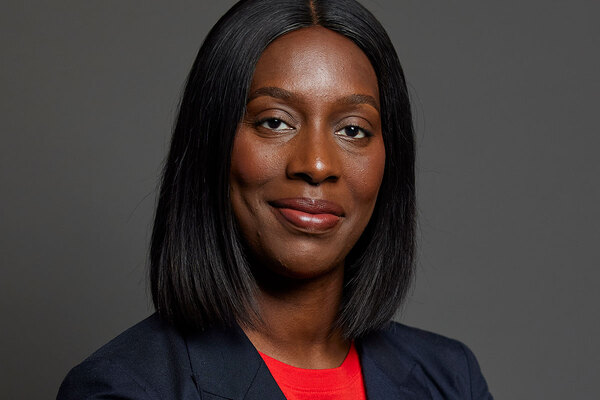The Inside Housing interview with Michael Gove: cross-party realisation we need more social rent
Housing secretary Michael Gove sits down with James Riding, in an exclusive interview covering how to build more social rent, the role for landowners, and those letters to housing association chief executives. Photography by Jon Enoch
![Michael Gove: “Homelessness is not [just] about housing, but you can’t solve homelessness without resolving our big housing problems” Michael Gove: “Homelessness is not [just] about housing, but you can’t solve homelessness without resolving our big housing problems”](https://omghcontent.affino.com/AcuCustom/Sitename/DAM/235/Gove_1_1200px.jpg)

Michael Gove’s office in the sleek fortress which houses the Department for Levelling Up, Housing and Communities (DLUHC) holds a hefty book collection, including lots of political biographies.
If the secretary of state has been turning to these books and thinking about legacy, it is perhaps appropriate. Mr Gove has agreed to an interview with Inside Housing as the country waits for an election date to be called. If the polls are to be believed, that election seems likely to bring Labour to power.
The initial frenzy of our meeting, as a fleet of DLUHC officials sail into the office, surround us and set their phones to record, might discombobulate someone who hadn’t been a senior minister for nearly 15 years. But Mr Gove is implacably courteous, and as soon as we sit down, he snaps into playful and energetic conversation.
“By expanding the number of homes for social rent, you can reduce the housing benefit bill overall, and you can give people a sense of stability and community”
With two stints in charge at the department, split by the political chaos of 2022, there is a strong case to be made that Mr Gove has been the most consequential housing secretary of the past 15 years. Yet he continues to press on. He is trying to fix the post-Grenfell building safety emergency after years of government inaction, including forcing big developers to pay for fire safety fixes, while a new social housing regulatory regime is embedded.
There have been setbacks under Mr Gove’s tenure, too. In late 2022, mandatory housing targets for councils were watered down to appease backbench MPs. Time is running out to deliver long-promised rental reforms. Most fundamentally, whether on housebuilding, homeownership or homelessness, the headline figures are moving in the wrong direction.
First, we ask what the secretary of state thinks about Inside Housing’s Build Social campaign, which calls for all the main parties to commit to a major programme of building social rent in their election manifestos.
More social rent
“We absolutely need more homes for social rent,” he tells Inside Housing. This is perhaps not the biggest surprise – as housing secretary, Mr Gove has consistently spoken in favour of social rent, a tenure that has been sparsely built in England since the government’s Affordable Homes Programme was cut in 2010. “By expanding the number of homes for social rent, you can reduce the housing benefit bill overall, and you can give people a sense of stability and community,” he says.
What does he make of Inside Housing’s call for 90,000 social rent homes a year over the next decade in England? It is “certainly… an honestly arrived-at assessment of need”, he says. But then, he adds: “To get it back up, I think that 30,000 is a stretching but achievable goal… So I won’t rubbish or criticise the 90,000 ambition. But I also recognise that if I were to try to commit the government to it at this stage, I would be over-promising.”
As he told ITV in July 2023, Mr Gove wants to see at least 30,000 new social rent homes a year.
Will we ever see an Affordable Homes Programme geared primarily around social rent again, or has that ship sailed? “No, I don’t think the ship has sailed,” he says. “There is realisation across parties that we need to, as you said, build more social.” Reconfiguring the Affordable Homes Programme is important, “but what landowners do, what the planning system does, what housing associations do, matter as well”.
That takes us to Mr Gove’s idea for how this could be achieved. Two streets down from DLUHC’s headquarters in Westminster is Page Street, one of London’s most striking housing estates. Its chunky, chequered blocks were the work of the Duke of Westminster, who was looking for a legacy. He gifted the lease to the council in 1929 and commissioned high society architect Edwin Lutyens to design homes specifically “for the working classes”.
A century later, as housing associations struggle to maintain their development programmes under economic pressure, Mr Gove says this altruistic vision for high-quality social rent homes might be reinvigorated. “We can look at some of the existing major landowners who are keen, out of a sense of stewardship, to provide more land for development, and who are keen to ensure that when that land is developed, there is a mix of genuinely affordable and socially rented homes, to do more,” he says.
Prince William’s initiative to use his private estate, the Duchy of Cornwall, for more social rent homes is one example, he suggests. “We are convening conversations with other major landowners in order to see if we can do more, because if you’ve got a whole society approach… then we can build on the progress that we’ve made.”
How does 139,000 children living in temporary accommodation make him feel? “It’s terrible,” he says. A previously announced uplift in Local Housing Allowance will help to mitigate the problem, he hopes, as well as last year’s £750m Local Authority Housing Fund, which allows councils to buy or build more homes. But “we do have a significant problem”, he says. “Homelessness is not [just] about housing, but you can’t solve homelessness without resolving our big housing problems.”
Michael Gove’s political CV
2021-2022, 2022-present: Secretary of state for levelling up, housing and communities
2019-2021: Chancellor of the Duchy of Lancaster and minister for the Cabinet Office
2017-2019: Secretary of state for environment, food and rural affairs
2015-2016: Secretary of state for justice and lord chancellor
2014-2015: Chief whip and parliamentary secretary to the treasury
2010-2014: Secretary of state for education
2007-2010: Shadow secretary of state for children, schools and families
2005-2007: Shadow minister for housing
2005-present: MP for Surrey Heath (Conservative Party)
Growing up in Aberdeen
Born in Aberdeen and adopted by his parents at four months old, Mr Gove grew up in a maisonette until he was seven, when the family moved to a semi-detached house. “I had a very real sense of neighbourliness and community,” he says. “Aberdeen is a city where, within a five minutes’ walk, you can move from very handsome detached granite mansions to social housing.” His grandparents on his mother’s side lived in “handsome and well-built 1930s” social housing, while his grandparents on his father’s side lived in “a nice part of Aberdeen, in a lovely detached house”.
Quality is a watchword for the housing secretary. “The stock of social housing that we have at the moment, which was built in an idealistic climate in the 1950s and ’60s, is… beyond the end of its natural life,” he says. That style of building, “even though it was driven by visionaries, actually condemned people to homes that were inadequate, in communities that did not have the services that they needed”.
A signature of Mr Gove’s tenure as secretary of state has been his naming and shaming of housing associations for their failures to fix some of the resulting problems for tenants. “I don’t relish writing letters because it’s an acknowledgement that people have been let down,” he says. He regularly hears from constituents whose housing providers are not maintaining properties the way they should: “Even [for] issues like basic repairs, it’s a trial to get the housing association to respond.”
The overwhelming majority of people who work in housing are “highly professional” and most housing associations “do a good job”, he says. “But we’ve got to focus on failure in order to drive it down and to help tenants.” Awaab’s Law is now on the statute books, and the consultation has set out how it will require social landlords to meet deadlines for emergency repairs. But what if it is not enough to push landlords to address their issues? “We’ll listen to what tenants are saying. And if there is cause for concern, and the need to do more, then we’ll do more.”
Under Mr Gove’s building safety legislation, the state and original developers are now signed up and paying for the removal and replacement of combustible cladding. But he has also said he wants to make insulation and cladding manufacturers pay, a pledge that is painfully relevant once again after a cladding-related fire in Valencia in February. This, he says, is “more difficult”, however, because of where some of these businesses are based. A construction products regulation white paper/green paper is “coming up”, and he has talked to Ireland’s Taoiseach about Kingspan, which made insulation that contributed to the Grenfell fire.
Will the government commit to publishing the Grenfell Inquiry report as soon as it is delivered, even if a general election is just around the corner? “Oh yes,” says Mr Gove. “I’m sure that the report will contain criticisms of government... But it’s only right that Sir Martin [Moore-Bick] and his team publish that report at the time that they deem right, in full, and that we respond as quickly as possible.”
With Inside Housing digging back through the archives for our 40th anniversary this month, we ask if Mr Gove takes any inspiration from politicians past on housing. He alights on an amusingly incongruous triptych of Michael Heseltine, Nye Bevan and Harold Macmillan: Lord Heseltine (Margaret Thatcher’s environment secretary) for his “focus on urban regeneration, what we now call levelling up”, Mr Macmillan, who under Sir Winston Churchill galvanised the private and public sectors to build 300,000 homes in a year, a feat unsurpassed by the current government – even if some of those homes were “not of sufficient quality”, and Mr Bevan, a Labour Party titan under Clement Attlee, because in his time, housing was part of health and “the links between poor-quality housing and poor health have become more apparent and quite rightly risen up the political agenda”. Mr Bevan also recognised “the aesthetic quality of homes” and believed it was “the right of working people to live in and to be surrounded by beauty”, he adds.
Those who know Mr Gove will say that on top of being superlatively political, he is endearing and charismatic in his own quirky way. In our meeting, he can’t resist a poke at his opposite number Angela Rayner for being “a huge supporter” of the Right to Buy (she was criticised last month for having bought her former council home).
“I want to be able to say that we have a plan to address all the areas of dysfunction in our housing system. And even if we can’t resolve all the problems… we’ve acted”
Lord Sumption, former Supreme Court judge, says: “[He is] extremely intelligent and although he has a bundle of views, many of which I disagree with, he’s also a remarkably candid figure, certainly in private. So he is quite a rewarding person to speak to. I think he’s absolutely right in having woken up, rather belatedly, to the significance [housing] has.”
Abi Brown, former Conservative leader of Stoke-on-Trent City Council and a senior member of the Local Government Association, says he is “probably the cleverest person I’ve ever had the pleasure of sitting next to. And clever people are not always a pleasure”. Mr Gove is “very quietly understated, but when he shines his light on you, you feel that”. The size of the mark he will leave behind may not be appreciated for some time, she says, but “how many other people will be able to look back and say they touched government policy around so many different things?”
What does Mr Gove himself hope his legacy as secretary of state will be? “I don’t know,” he says. “Without wanting to be too much of a cockeyed optimist, I hope that we can win the election and I can carry on in this role for a while to come. But at the very least, I want to be able to say that we have a plan to address all the areas of dysfunction in our housing system. And even if we can’t resolve all the problems… we’ve acted.
“I’d like to think that people would recognise that this department has recognised the scale of action required and is under no illusions about how big those challenges are – and how radical the action is needed to fix it.”
Recent longform articles by James Riding
Dagenham fire: what happened and what we know about the building
A fire at a block of flats in Dagenham, east London, on Monday has sparked fresh debate about the slow progress of cladding remediation in the UK. James Riding runs through what we know so far
Peter Denton discusses the Homes England review and Section 106 jitters
Homes England’s chief executive tells James Riding that a new government review is a “call to arms” for the agency to take a more hands-on role in development
The man who runs Homes England’s Affordable Homes Programme
Shahi Islam speaks to James Riding about his new role as director of Homes England’s Affordable Homes Programme and his desire to be “more front-facing” in the sector
Sign up to our Best of In-Depth newsletter
We have recently relaunched our weekly Long Read newsletter as Best of In-Depth. The idea is to bring you a shorter selection of the very best analysis and comment we are publishing each week.
Already have an account? Click here to manage your newsletters.













